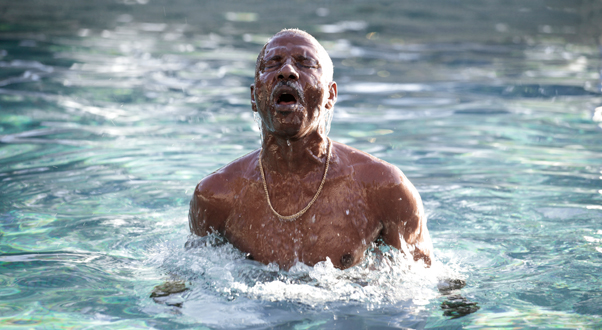|
Reviews of Recent Independent, Foreign, & Documentary Films in Theaters and DVD/Home Video

A SCREAMING MAN Always immaculately dressed in white, Adam reigns as the pool attendant at a Chadian hotel resort hotel filled with Europeans, at least while the decades-long civil war remains at bay. The former 1965 Central African swimming champion and the first pool attendant in Chad, Adam tops the hotel staff’s pecking order, having the cushiest position and indirectly privileged by the proximity to wealth and comfort. He’s appropriately nicknamed the “Champ,” and he has the swagger that goes with it, until the employees are called in one by one to human resources. Mrs. Wang (Li Heling), the HR director, informs Adam that under the new ownership, two attendants are unnecessary; she demotes him to gatekeeper, leaving Adam’s son and minion Abdel (Diouc Koma) in charge of the bathers. At 20, Abdel has the stamina to work all day and stay out until all hours of the night—doing what with whom, he withholds from his father. To add insult to the humiliation, Adam’s new, drab uniform is at least two sizes two small. Out of sub-Saharan Africa comes this x-ray vision of failed expectations, as relevant as John Wells’s recession-set The Company Men. Director Mahamat-Saleh Haroun pierces through male pride, and not just when Adam stands in front of a mirror, shirtless, holding in his stomach (though the 55 year old is still in admirable shape). During its first two-thirds, A Screaming Man holds the promise of a Greek tragedy centered on what it takes to get ahead, regardless of who you have to step over or if there’s a war going on. In directing his cast, Haroun initially and confidently depicts the turn of events through small, indicating details: Abdel averts his eyes away from his father after he first receives his promotion, the sounds of fighter jets overhead increase as the rebels advance closer to the city, and French soldiers become the only guests at the poolside oasis. The film also has something in common with James M. Cain’s Mildred Pierce, describing as it does a hardworking, sacrificing parent who feels betrayed by a feckless, undeserving child—though Abdel is not much of a bad seed. Unfortunately, Haroun fails to lift his universal
fable to the height of an epic, whatever its budget. His two lead actors
back off from the demands of the father and son rivalry. As the drama
darkens, the acting stiffens. As Adam, Youssouf Djaoro, a reticent
presence, lacks spontaneity while reacting to his changing world; he’s
too physically restrained. And the
director doesn’t do his ensemble any favors by filming most scenes
within one shot. In an interview, Haroun said he felt the distance
between the characters and the camera would prevent the audience from
feeling manipulated. Without cutaways or any coverage, though, he leaves his
actors even more vulnerable and the viewers removed. Because of the
impersonal, all-observing camera and the languid pacing, they have the
heaviest burden to engage the audience. Adam may be screaming inwardly,
but emotionally, he’s on mute.
Kent Turner
|

